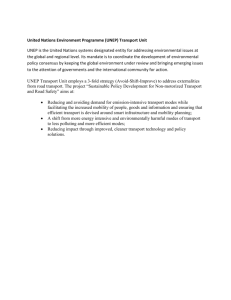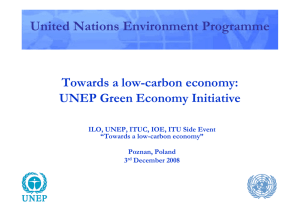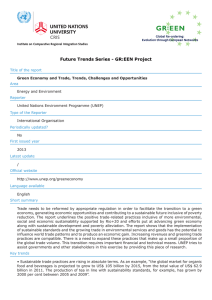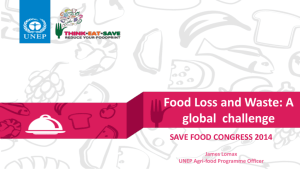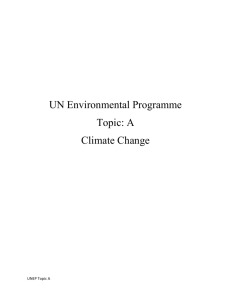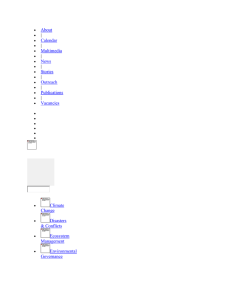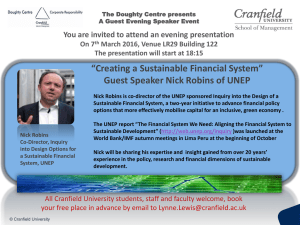Biographies of speakers and panelists to the 14th Global Major
advertisement
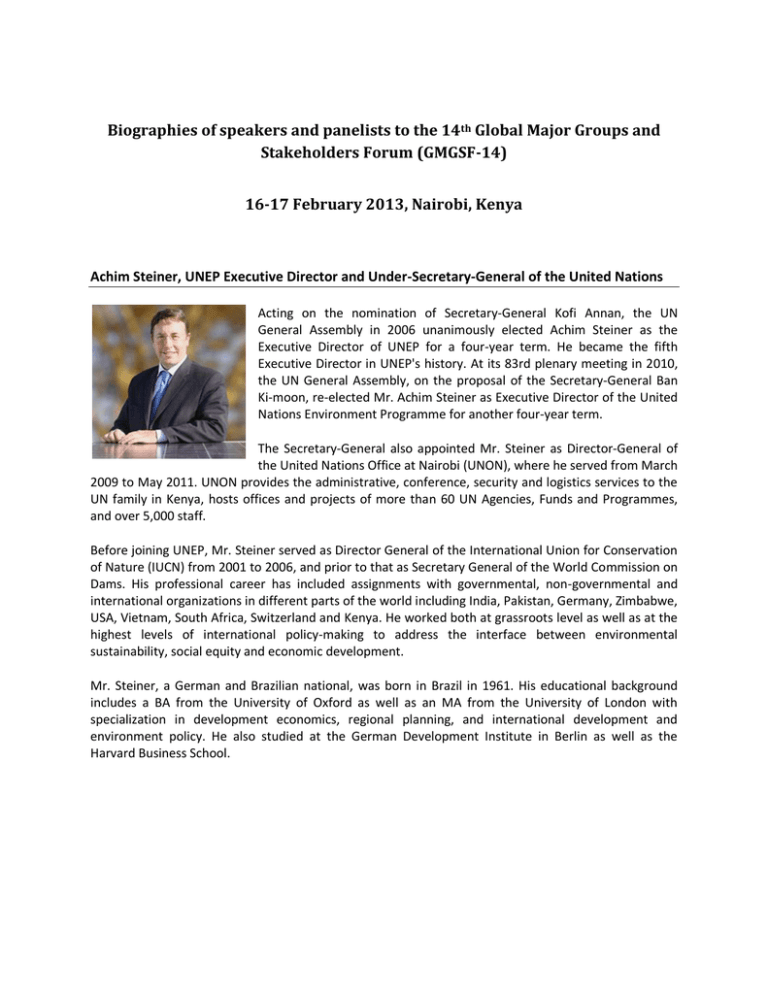
Biographies of speakers and panelists to the 14th Global Major Groups and Stakeholders Forum (GMGSF-14) 16-17 February 2013, Nairobi, Kenya Achim Steiner, UNEP Executive Director and Under-Secretary-General of the United Nations Acting on the nomination of Secretary-General Kofi Annan, the UN General Assembly in 2006 unanimously elected Achim Steiner as the Executive Director of UNEP for a four-year term. He became the fifth Executive Director in UNEP's history. At its 83rd plenary meeting in 2010, the UN General Assembly, on the proposal of the Secretary-General Ban Ki-moon, re-elected Mr. Achim Steiner as Executive Director of the United Nations Environment Programme for another four-year term. The Secretary-General also appointed Mr. Steiner as Director-General of the United Nations Office at Nairobi (UNON), where he served from March 2009 to May 2011. UNON provides the administrative, conference, security and logistics services to the UN family in Kenya, hosts offices and projects of more than 60 UN Agencies, Funds and Programmes, and over 5,000 staff. Before joining UNEP, Mr. Steiner served as Director General of the International Union for Conservation of Nature (IUCN) from 2001 to 2006, and prior to that as Secretary General of the World Commission on Dams. His professional career has included assignments with governmental, non-governmental and international organizations in different parts of the world including India, Pakistan, Germany, Zimbabwe, USA, Vietnam, South Africa, Switzerland and Kenya. He worked both at grassroots level as well as at the highest levels of international policy-making to address the interface between environmental sustainability, social equity and economic development. Mr. Steiner, a German and Brazilian national, was born in Brazil in 1961. His educational background includes a BA from the University of Oxford as well as an MA from the University of London with specialization in development economics, regional planning, and international development and environment policy. He also studied at the German Development Institute in Berlin as well as the Harvard Business School. Amina Mohamed: UNEP Deputy Executive Director and Assistant-Secretary-General of the United Nations Ms. Amina Mohamed, a Kenyan national, joined UNEP as the Deputy Executive Director in July 2011, following her appointment by SecretaryGeneral Ban Ki-moon. Before joining UNEP, Ms. Mohamed served as the Permanent Secretary and Chief Executive Officer of the Ministry of Justice, National Cohesion and Constitutional Affairs of the Republic of Kenya. Under Ms. Mohamed's leadership, the Ministry of Justice implemented political, legal and constitutional reforms following the elections in 2007. In 2010, the new Constitution of Kenya was promulgated under her Ministry's guidance and stewardship. Before her appointment in 2006 as Permanent Secretary, Ms. Mohamed was the Ambassador and Permanent Representative of Kenya to the United Nations and other International Organizations, including WTO, in Geneva, Switzerland from 2000 to 2006. As Ambassador and Permanent Representative, Ms. Mohamed was twice elected as Chair of the African Group of the Whole in Geneva and, during her tenure, played a large number of critical roles in intergovernmental and multilateral negotiations. Ms. Mohamed was elected as Chair of the General Council of WTO in 2005, the first woman elected to the position. Ms. Mohamed has throughout her career served her country as a distinguished public and Foreign Service Officer. As an international lawyer and accomplished diplomat with profound experience in environment and sustainable development policy setting, Ms. Mohamed also has a demonstrated trackrecord in intergovernmental negotiations. She has been recognized internationally for successfully leading international and national policy processes and for having assumed leadership roles working in complex and multi-cultural environments. As a diplomat and policy maker, she has been instrumental in advancing the environmental and sustainable development agenda at the national and international level. She is strategic and visionary, combined with a profound dedication to management, reform and the transformation of organizations. She has extensive knowledge of the UN-system - including serving at Kenya's Permanent Mission to the UN in New York for four years. Ms. Mohamed's current role is to further advance the implementation of UNEP's Medium Term Strategy and Progmmme as well as on-going internal management reform. She will also play a critical role in further catalysing UNEP's political engagement with key governments and intergovernmental processes in particular RIO+20 summit in 2012 and support efforts to enhance the funding base of the Organization. Amina J.Mohammed, Special Advisor of the Secretary-General on Post-2015 Development Planning Amina J. Mohammed of Nigeria is the Secretary-General’s Special Adviser on Post-2015 Development Planning. Ms. Mohammed was previously Senior Special Assistant to the President of Nigeria on the Millennium Development Goals after serving three Presidents over a period of six years. In 2005 she was charged with the coordination of the debt relief funds ($1 billion per annum) towards the achievement of Millennium Development Goals in Nigeria. From 2002-2005, Ms. Mohammed served as coordinator of the Task Force on Gender and Education for the United Nations Millennium Project. She was also a member of the SG's Global Sustainability Panel. Her brief intervention will focus on 'working towards a single and cohesive Post 2015 sustainable development agenda' and will touch on the essential contribution of major groups and other stakeholders. MGS Speakers and Facilitators Anabella Rosemberg, Policy Officer, International Trade Union Confedaration (ITUC) and Trade Union Advisory Committee to the OECD (TUAC) Policy Officer on Environment and Occupational Health and Safety of the International Trade Union Confederation (ITUC) and the Trade Union Advisory Committee to the OECD (TUAC), Anabella Rosemberg has co-ordinated the international trade union movement’s input to major environmental intergovernmental processes, notably the UNFCCC, since 2007. She also acts as a liaison contact point between ILO Green Jobs Initiative, UNEP’s Green Economy work and the trade union movement. Anabella Rosemberg is co-ordinating the work of the trade union movement in preparation for the RIO+20 Summit. Born in 1980, in the Argentinean Patagonia, she holds a Masters Degree in Development Studies, Institut d’Études Politiques de Paris.Before joining the ITUC/TUAC, she worked for non-governmental organisations, in the areas of democracy and human rights. Caroline Usikpedo-Omoniye, Founder and National President, Niger Delta Women’s Movement for Peace & Development (NDWPD) Ms. Usikpedo-Omoniye founded this NGO in 2005 with the vision to empower the Niger Delta women and the most vulnerable people in the region. She has steadfastly worked to carry the message of her organization to global arenas and has reached out internationally to connect with other anti-poverty, Women’s Human rights, environmental and women’s organizations and networks. Consequently, NDWPD achieved Special Consultative Status with the United Nations ECOSOC. Caroline mobilized in 2008-2012 for the GCAP Stand Up Take Action Campaign Days, International Day of Climate Action, and the United Nations Human Rights Day in the Niger Delta. Caroline has participated in ongoing global debates on gender, climate change and environment and will continue to share the Niger Delta cases with the world in hopes of raising awareness. She has actively fought for Gender Equality, Women Inclusion in Decision making and Women’s Rights ad Empowerment at rural areas, in Nigeria. Through the Niger Delta Women Resource Centre, Caroline has trained over 300 women and girls in skills and vocations of choice in 2010 and 2012. Due to her achievement, Caroline was awarded with Special Recognition Award by the United Nations Millennium Campaign (UNMC). Based on her track record and success stories of fighting for Women’s human rights and Gender Equality, on December 10, 2011, she was appointed Ambassador of Goodwill for Women Empowerment in Nigeria by the International Human Rights Commission. She is presently a Diplomat of the IHRC. Daniel Magraw, President Emeritus at the Centre for International Environmental Law (CIEL) and Distinguished Scholar Daniel Magraw is a Fellow at the Foreign Policy Institute at Johns Hopkins School of Advanced International Studies (SAIS) and President Emeritus at the Center for International Environmental Law (CIEL). He has extensive experience in international law, institutions, processes and policies, particularly relating to environmental protection and human rights, including having worked in government, nongovernmental organizations (NGOs), inter-governmental organizations, business, and academia. Professor Magraw was President and Chief Executive Officer of CIEL from January 2002 to September 2010, during which time he also worked on substantive projects, including climate change, international financial institutions, toxic chemicals, oceans, democratizing international dispute settlement, trade and environment, and the law of foreign investment. He continues to work on substantive matters at CIEL as President Emeritus. He represents India in an arbitration brought by Pakistan under the Indus Waters Treaty, was for many years a member of the U.S. government’s Trade and Environment Policy Advisory Committee (TEPAC), chairs the American Bar Association (ABA) Section of International Law’s Task Force on Magna Carta, serves as a consultant to the United Nations, and is on the Board of Directors of Lightbridge Corporation, a publicly traded company. From 1992-2001, Professor Magraw was Director of the International Environmental Law Office at the U.S. EPA. Initially a political appointee, he became a career member of the Senior Executive Service. He served on scores of United States delegations to international negotiations and other meetings. While on leave from his international environmental law position at EPA, he co-chaired a White House assessment of the regulation of genetically engineered organisms (5/00-1/01) and served as the Acting Principal Deputy Assistant Administrator of EPA’s Office of International Activities (1/01-8/01). Professor Magraw teaches international environmental law and policy at SAIS. From 1983-92, he was Professor of Law at the University of Colorado, where he was the faculty initiator of the Colorado Journal of International Environmental Law & Policy. He was a Visiting Scientist at the National Center for Atmospheric Research in 1989. He organized international conferences on international pollution, global change, and international watercourses at the Universities of Virginia and Colorado. He has also taught at the University of California, Berkeley and Georgetown University Law Center. Professor Magraw worked as an economist and business consultant in India as a Peace Corps Volunteer (1968-72), where he helped develop and manage the largest (over 600 employees) and most successful co-operative of its type in India. He stayed for a third year at the request of the Tamil Nadu state government to conduct a marketing survey of rural areas. He practiced international law, constitutional law, and bankruptcy law at Covington & Burling in Washington, DC from 1978-83, during which time he spent six months practicing poverty law at the Neighborhood Legal Services Program. He also worked on pro bono cases with the American Civil Liberties Union and League of Women Voters. Professor Magraw has lectured extensively in the United States and abroad on a wide variety of international law topics, and he has written books and articles on many international law subjects, including international environmental law, women’s human rights, the Iran-US Claims Tribunal, international trade and the environment, sustainable development, accountability in international dispute settlement, and philosophy and environmental protection. He also has been active – often in a leadership capacity -- in a wide variety of professional organizations, including the ABA, American Law Institute, American Society of International Law, International Law Association, and Inter-American Bar Association. He is the recipient of many awards, including the ABA’s Award for Distinguished Achievement in Environmental Law and Policy, the District of Columbia Bar Association’s Public Service Award for International Law, the United Nations Association National Capital Area’s Louis Sohn Award for Human Rights, and the Elizabeth Haub Award for Environmental Law (Stockholm University and International Council of Environmental Law). Mr. Magraw has a J.D. degree from the University of California, Berkeley (1976), where he was Editor-inChief of the California Law Review and a founder of the Berkeley Law Foundation (an NGO that funds law projects serving under-privileged and under-represented people and communities). He has a B.A. with high honors in Economics from Harvard University (1968), where he was student body president, a volunteer worker in a housing project, a varsity letter-winning swimmer, and on the stage crew of the Loeb Drama Center. He studied music in India (the veena) and at the University of Minnesota (music theory). Jan-Gustav Strandenaes, Senior Advisor, Stakeholders Forum Jan-Gustav had his debut with the UN and the environment in the 1970s through the Stockholm Conference for Environment in 1972 and has stayed with this arena ever since, worked on disseminating information on and teaching about UN issues during the 80s and early 90s, has followed and worked with the UN Commission for Sustainable Development since 1997, when he that year, was a liaison officer between the UN and the NGO community at the UN headquarters in New York. After his first assignments for the UN in Latin America in the 70's, Jan-Gustav has worked and lived in Botswana, Uganda, the US and Sweden in addition to Norway. He has extensive NGO experience developed through three decades in almost all continents in the world, speaks several languages and has lectured and given workshops all over the world on the UN, governance, the environment and sustainable development, evaluated projects and organisations, advised governments on relations with civil society, chaired UN meetings and facilitated UN processes, translated several books from English to Norwegian and authored two books and numerous articles on the environment and sustainable development. He serves on a global civil society committee for UNEP and is presently the global UN CSD NGO CoOrganising Partner coordinating global NGO input into the UN CSD process and into preparatory process for the UN Conference on Sustainable Development to be organised in 2012 in Brazil. Jan-Gustav joined Stakeholder Forum in London in 2011. hile also operating as a free-lance adviser, Jan-Gustav is part time employed by the Brussels-based, international NGO, ANPED, as their Policy Adviser, advices on CSR issues for a private sector think tank in Norway, but works out of his home outside Oslo, Norway, when he is not travelling the world, writing, lecturing or otherwise working abroad on environment, governance and sustainability issues while observing and writing on political behaviour. Jeremy Wates, Secretary General, European Environmental Bureau Jeremy Wates is the Secretary General of the European Environmental Bureau, Europe’s largest federation of environmental organizations comprising more than 140 member organizations from some 30 European countries with a combined membership of around fifteen million environmentally concerned citizens. Prior to taking up his present post in May 2011, Jeremy served for more than a decade as Secretary to the Aarhus Convention with the Genevabased United Nations Economic Commission for Europe. The Aarhus Convention is the world’s most far-reaching international treaty on access to information, public participation in decision-making, and access to justice in environmental matters. During the 1990s, Jeremy led the campaign by the European ECO Forum, an NGO coalition, to persuade governments to start work on a treaty on environmental democracy and then coordinated the input from civil society organizations into the official negotiations over the text of what was to become the Aarhus Convention. In the 1980s, Jeremy founded the Irish environmental organization Earthwatch, the Irish member of Friends of the Earth International, and led the organization for more than a decade. Jeremy holds an MA Honours Degree in Philosophy and Social & Political Sciences from Cambridge University, UK. His permanent home is in West Cork in the south-west of Ireland where in the ‘80s and ‘90s he combined his environmental activism with small-scale organic farming. He and his wife Sandra have four children. In 2011, Jeremy was awarded the David Brower Lifetime Achievement Award. Kehkashan Basu, Global Coordinator for UNEP’s Major Groups for Children and Youth Kehkashan Basu is a 12 year old environmental and social activist living in the United Arab Emirates whose sole objective is to involve and mobilise children and youth in the movement for a sustainable and green future. Born on 5th June which is also World Environment Day, she feels that it was pre-ordained that she should grow up to be an eco-warrior. Spreading the message of peace and sustainability has been her passion since she was only 8 years old and she has worked tirelessly to enlist the support of children and youth across geographical boundaries. She has been elected as the Global Coordinator for UNEP’s Major Groups for Children and Youth and is the first minor to hold this position. She was the youngest participating international delegate at Rio+20 held in June 2012 in Rio de Janeiro, Brazil. While in Rio, she won a global award from UNCCD and she was the only child to be a part of a UN press conference there, held to mark the World Day to Combat Desertification. At Rio+20, she conducted several workshops on sustainability and also launched the first Asia Pacific Youth Water Summit. She was chosen by UNCSD MGCY to be the voice of the children and youth at several forums and reached out to the children of Rio’s favelas slums) to integrate them in the march towards sustainability. As a member of the Arab Youth for Climate Movement, she attended the Conference of Youth (COY8) and also COP18, the United Nations Conference on Climate Change in Doha, Qatar and she was the youngest panelist at a side event of this conference where she spoke on sustainability. In addition to the above, her work as a youth ambassador has seen her participating in over a dozen international conferences, notable amongst which have been Eye on Earth summit, World Future Energy Summit, COP11 - CBD and the Asia Pacific TUNZA conference .Her work on environmental advocacy won her a prize from the Korea Green Foundation and she was invited to give a presentation at the 2012 Global Youth for Environment Forum held in Seoul, Korea. Kehkashan is the founder of a youth organization, GREEN HOPE UAE, which seeks to provide a networking platform to children and youth in the region to carry forward the Rio legacy. She is a Climate Justice Ambassador for Plant-for-the-Planet and in her role as the Academy Coordinator conducted the first Plant-for-the-Planet in the UAE which inducted scores of school children and culminated in the planting of 64 saplings in one day. She also holds positions such as Regional Ambassador of TUNZA Ecogeneration, Country Coordinator of TARUMITRA & GREEN The GENE. She is an active member of UNEP, United Nations Major Groups for Children & Youth (UNCSD MGCY) and the Emirates Environmental Group. She is currently the Chairperson of the UAE chapter of the International Youth Council. She has actively pursued a number of ground level projects on the environment and biodiversity conservation. She plants a tree on every birthday as a symbol of her solidarity to the green cause. She has planted over a hundred saplings in the UAE, Indonesia, Kenya and Brazil. Kehkashan works towards being the change for a better future and believes in the words of Mark Twain “Don't go around saying the world owes you a living. The world owes you nothing. It was here first”. Lalanath De Silva, The Access Initiative/ World Resources Institute (WRI) Lalanath De Silva was a public interest litigator and advocate for over two decades. Pioneering the growth of public interest law in the area of the environment, he appeared in many of Sri Lanka’s leading environmental cases on behalf of victims, communities and nongovernmental organizations. He also worked for the Government of Sri Lanka for two years as the Legal Consultant to the Ministry of Environment and Forests. During that time he was responsible for drafting and enacting the bulk of Sri Lanka’s environmental regulatory provisions. From 2002-2005 he served as a Legal Officer in the Environmental Claims Unit of the United Nations Compensation Commission (UNCC) in Geneva. Together with a small group of international lawyers, he helped process the largest war reparations claims handled by the UNCC to monitor, assess, restore and compensate for environmental damage resulting from the 1991 Gulf War. Lalanath joined the World Resources Institute (WRI) in 2005 as the Director of The Access Initiative (TAI) (www.accessinitiative.org). Since then he has been focusing on helping over 150 civil society groups in over 40 countries assess the status of access to information, public participation and access to justice in their countries. Through these assessments, civil society partners identify gaps in access laws, practices and institutions and undertake activities that will change the situation on the ground. Lalanath qualified as a lawyer from the Sri Lanka Law College and has a Master of Laws degree from the Law School, University of Washington, Seattle, USA. Luc Lavrysen, Judge, Belgian Constitutional Court and President, EU Forum Judges for the Environment Doctor in Law of the Ghent University, has done extensive work on environmental law in a changing institutional context and on the development of environmental law from a public law perspective. Prof. Lavrysen was a Legal Secretary at the Court of Arbitration (now Constitutional Court), Brussels, and a State Councillor, before becoming in 2001 a Judge at the Constitutional Court of Belgium. He successively combined these functions with the position of scientific researcher (1985-1989), voluntary assistant (1989-1991), academic counsel (1991-1992) and visiting professor (1992-1998) at Ghent University in the domain of environmental law. He is also Secretary to the Centre for Sustainability and member of the board of the Centre for Environmental Sanitation; Chief editor of a magazine on environmental law: ‘Tijdschrift voor Milieurecht’.; Scientific advisor to the Federal Council for Sustainable Development and president of their Product Standards group; and visiting professor at the University of Antwerp, member of the Environmental Law Network International, of Avosetta, the European forum of Judges for the Environment. Lucy Mulenkei, Executive Director of Indigenous Information Network (IIN) Lucy Mulenkei is the Executive Director of Indigenous Information Network (IIN) and is also the Chair of Indigenous Women and Biodiversity Network, a network that bring indigenous women worldwide working on issues of biodiversity as a strategy to enhance the role played by indigenous women as caretakers of earth. Besides being the editor of Nomadic News, a magazine that covers different development issues concerning indigenous nomadic pastoralists and hunter gatherers, Ms Mulenkei trains people on basic human rights, leadership and environmental conservation (especially on traditional knowledge). She also works closely with the Ministry of Environment and Natural Resources on the collection of data and development of National Action Plans to help combat desertification. In recognition for Ms Mulenkei’s work with indigenous people, she was awarded various awards such as the Environmental Leadership Award, the Merit Certificate for the Advancement of the rights of Pastoralist Women in Kenya and EVE Magazine ‘Women of the Year’ Award. Luis Flores, Consumers International Luis implements all of the work related to CI's policy and campaign development for the Latin American region. Luis coordinated CI's work for the Rio+20 Earth Summit on Sustainable Development. Since 2005, Luis has been managing sustainable consumption issues in the region, actively participating in a number of relevant related UN forums and instances such as UNEP, UNDP and UNESCO. Luis was trained as a lawyer and has studied environmental management and consumer protection. Luis is based in Santiago. Marcos A. Orellana, Director of CIEL's Human Rights and Environment Program Prior to joining CIEL, Dr. Orellana was a Fellow to the Lauterpacht Research Centre for International Law of the University of Cambridge, UK. He also was a visiting scholar with the Environmental Law Institute in Washington DC. Previously, Dr. Orellana was Instructor Professor of international law at the Universidad de Talca, Chile and a consultant to various international governmental and non-governmental organizations. He also has provided legal counsel to the Chilean Ministry of Foreign Affairs on international environmental issues, and in that capacity has joined official delegations to meetings of select MEAs. In 1997-1998, Dr. Orellana completed the LL.M. program at American University Washington College of Law (WCL), during which time he also was an intern at the World Bank's Inspection Panel. In 2009 Dr. Orellana obtained his S.J.D. doctoral degree from WCL upon successful defense of a thesis entitled: Health, Safety and Environmental Measures in International Economic Law. Since 2002, Dr. Orellana has offered various courses at WCL, including: the International Law of the Sea; International Trade and the Environment; and Investment Arbitration & International Human Rights Law. Neth Daño, Programme Manager, ETC Group Neth Daño is a Researcher who has extensive experience in development and policy work on issues in agriculture, agricultural biodiversity, biosafety, climate change and environmental governance in Southeast Asia. She earned her Bachelors’ degree in Development Studies (cum laude) from the University of the Philippines, and completed her Master’s degree in Community Development. ETC Group monitors the impact of emerging technologies and corporate strategies on biodiversity, agriculture and human rights. Oliver Greenfield, Convenor, Green Economy Coalition Oliver is the Convenor of the Green Economy Coalition. Convenor is a carefully considered title to reflect network leadership, inviting people from diverse institutions and networks to work together, and enabling them to influence collectively. The Green Economy Coalition is a network and a platform to progress green, fair and inclusive economies. It champions inclusion, equity and environmental limits. Its rapidly growing global network include: IUCN, WWF, IIED, IISD, ITUC and GRI and many others. It works to create convergence of different agendas: jobs, industry, environment, poverty reduction and economics to find shared policy and action. It develops multi-stakeholder working groups to tackle the areas of greatest concern or opportunity. It ensures implementation is monitored and best practice shared, from local to global and from nation to nation. Prior to this role, Oliver led WWF’s Sustainable Business and Economics work, where he pioneered systemic stakeholder change programmes: One Planet Business, One Planet Finance and One Planet Economy. Before WWF, Oliver managed change in the public sector and in industry, as the senior strategist for the BBC World Service and as a business strategy consultant for Booz Company. He has degrees in engineering and business and has worked with many organisations and cultures for social, environmental and economic value.He invites you to contribute at www.greeneconomycoalition.org/ oliver.greenfield@greeneconomycoalition.org Paul L. Quintos, Head of Policy and Communications of IBON International Paul L. Quintos is currently the Head of Policy and Communications of IBON International, an international non-governmental organization (INGO) that promotes new development thinking for economic and social justice through capacity development of people’s movements around the world. Before joining IBON, Mr. Quintos was an organizer and educator in the progressive labor movement in the Philippines for over a decade. He obtained his MSc. in Development Studies from the London School of Economics and Political Science, and has held positions in the academe, in government and in various NGOs. Sacha Gabizon, Executive Director, Women in Europe for a Common Future (WECF), Major Groups Facilitating Committee Sascha Gabizon, is the Executive Director of WECF Women in Europe for a Common Future. WECF is a network of 90 women’s and environment organizations based in 30 countries of Europe, Eastern-Europe, Caucasus and Central Asia. Sascha Gabizon has a Dutch Nationality, and worked from 1992-1995 with the Wuppertal Institute for Climate, Energy and Environment (WI), where she was the co-founder of the Wuppertal Institute’s "FrauenWissen" (Women's Scientists). In 1994 Sascha Gabizon joined WECF to prepare the WECF conferences during the 4th World Women's Conference in Beijing in 1995. Since 1996, Sascha Gabizon has been the director of WECF and developed the network and its activities in Western and Eastern Europe and Central Asia. In 1999 she founded the German WECF-office, which works in close cooperation with the Netherlands WECF office, both serve as secretariat for the network activities of WECF. As executive director of WECF, Sascha Gabizon is responsible among others for the implementation of the water and sanitation programmes in Eastern Europe, Caucasus and Central Asia, in particular for rural areas. Currently these programmes involve some 6000 beneficiaries, receiving access to safe water supply and sanitation, in particular dry urine-diverting toilets which allow nutrient recycling and on-site waste-water soil filters. Yunus Arikan, Manager, Cities Climate Center, ICLEI Born in Ankara, Turkey in 1972. Graduated from TED Ankara College in 1990 and Middle East Technical University in 1994. As an environmental engineer, he has been primarily been involved in waste management and cleaner production. Between 2002-2008, he took an active role in promotion of progressive climate change policies in Turkey and Central and Eastern Europe, specifically in Turkey´s involvement in the international climate process and access to the Kyoto Protocol in 2009. Since February 2009, he is acting as the Manager of the Cities Climate Center of ICLEI Local Governments for Sustainability, based in Bonn, Germany. Within this scope, he is the focal point for Local Government and Municipality Constituency Authorities to the UNFCCC, Secretariat Director of the World Mayors Council on Climate Change and Manager of Bonn Center for Local Climate action and Reporting - carbonn. He is married and has one daughter. UNEP Speakers Tomoko Nishimoto, Director, Division of Regional Cooperation, UNEP Ms. Tomoko Nishimoto joined UNEP as the Director, Division of Regional Cooperation in May 2010. She is responsible for overseeing the six regional offices of UNEP: North America; Latin America and the Caribbean; Africa; Asia and the Pacific; West Asia; and Europe. She is also responsible for UNEP’s interactions with Major Groups and Stakeholders. Finally Ms. Nishimoto oversees UNEP’s engagement at the regional and country‐level, particularly to enhance UNEP’s participation in the work of UNCTs, such as UNDAF. Ms. Nishimoto has over 25 years of experience in sustainable development work within the United Nations. Her professional career has included assignments with the United Nations Development Programme (UNDP), for 18 years, and with the United Nations Children's Fund (UNICEF), for 5 years. She has held senior posts in seven countries. Among other roles, she served as the UNDP Country Director for Kenya (2008-2010), the UNDP Deputy Resident Representative in Ethiopia (20052008) and the UNICEF Zambia Deputy Representative (2001-2005). During these assignments Ms. Nishimoto supervised and managed diverse functional groups across a wide spectrum of programmes and operations, including programme management, monitoring and evaluation, financial management, human resource management and communications. She provided guidance to a wide variety of programmes and projects in areas such as environment and energy, poverty reduction, water and sanitation, disaster risk reduction, sustainable livelihoods and recovery, food security, good governance, HIV/AIDS, gender, and ICT. She has been involved with projects executed by various United Nations agencies (such as the United Nations Office for Project Services, the Food and Agriculture Organization, the International Labour Organization, the International Trade Centre, the United Nations Industrial Development Organization, UNESCO, and the World Health Organization) with funding from key donors, including the European Commission, the UK Department for International Development, the United States Agency for International Development, Norway, the Netherlands, Denmark, Finland, Japan, Sweden, Germany, Canada and the World Bank. Ms. Nishimoto has worked extensively with civil society organizations throughout her career. Ms. Nishimoto is a trained Facilitator for Human Rights-based Approach to Programming. She is a Japanese national, and holds a BA from Kobe University in Kobe, Japan, and a Masters degree in International Relations from the Graduate School of Sophia University in Tokyo, Japan. Fatoumata Keita-Ouane, Head, Scientific Assessment Branch, Division of Early Warning and Assessment Ms. Fatoumata Keita - Ouane is currently the Chief of the Scientific Assessment Branch in the Division of Early Warning and Assessment. She is a scientist who holds a degree in Pharmaceutical Sciences and an advanced degree in Toxicology from the "Université Catholique de Louvain", Belgium. She started her international career at WHO Division of Pharmaceuticals and then joined UNEP Chemicals Branch in Geneva where she was in charge of chemical management capacity building, particularly in African countries. In that position she initiated activities to build national chemical management infrastructures and prepare countries for the negotiations of the Rotterdam and Stockholm Conventions. Before joining DEWA she was Senior Scientific Affairs Officer at the Stockholm Convention Secretariat and led the establishment of the Persistent Organic Pollutants Review Committee and the Effectiveness Evaluation Programme for the Convention. Ms. Keita-Ouane is a citizen of Mali and mother of two. Charles Arden-Clarke, Head of the Goods and Services Unit in the Sustainable Consumption and Production (SCP) Branch, UNEP Charles Arden-Clarke trained as a zoologist in the UK and South Africa. He began his professional career in 1984 with the Political Ecology Research Group, a non-profit making environmental consultancy in the UK, working on a range of issues, including assessing the impacts of civil nuclear power, conventional and organic farming systems and acid rain. Between June 1990 and December 1999 he worked for WWF International in Switzerland, where he developed and led WWF’s Trade and Investment work programme, also covering ISO standards, eco-labelling and agriculture and environment issues. In January 2000 he joined UNEP's Economics and Trade Branch in Geneva, working on trade and environment, focusing on the effects of trade liberalisation on the environment and the relationship between WTO rules and multilateral environmental agreements (MEAs). He also undertook capacity building activities to assist countries in the integration of trade, environmental and development objectives. In 2004 he moved to UNEP’s Division on Technology, Industry and Economics (DTIE) in Paris, where he is currently the Head of the Goods and Services Unit in the Sustainable Consumption and Production (SCP) Branch. This unit serves as the secretariat of the Ten Year Framework of Programmes on SCP patterns (the “10YFP”), supports integration of SCP objectives into development planning and policies, and promotes sustainable tourism policies and practices. Asad Naqvi, Acting Head of the Green Economy Advisory Services Unit, UNEP Asad Naqvi is currently serving as Acting Head of the Green Economy Advisory Services Unit at UNEP, which is assisting 24 countries in advancing their green economy transition. He leads research and advisory work on poverty, equity, agriculture and food and trade in biodiversity products. Asad has 17 years experience of research, policy advice and coordinating interagency initiatives. He joined UNEP in 2004 and has managed and coordinated the production of the Agriculture Chapter of the UNEP Green Economy Report, Organic Business Guide, a report on agriculture and food security in Africa, and an eight-country review of best policy practices to promote organic agriculture. He directly managed advisory services and preparation of studies for Barbados, Nepal, Namibia, Peru, the EECCA region based on national studies from Armenia, Moldova and Ukraine, and Integrated Assessment of Organic Agriculture in Kenya, Tanzania and Uganda, Before taking on responsibilities of the Green Economy Initiative, Asad served as Coordinator of UNEPUNCTAD Capacity Building Task Force on Trade, Environment and Development (CBTF) where he played a key role in the development of the East African Organic Product Standard (EAOPS) and various policy reforms in the region. He also contributed to the CBTF work on Wildlife Trade Policy Reviews in Uganda, Viet Nam, Nicaragua and Madagascar. This work led to the development of Framework for Reviewing National Wildlife Trade Policies, and a study on Social Dynamics and Wildlife Trade. Prior to joining UNEP in 2004, Asad worked as Programme Advisor for UNDP’s Regional Governance Programme for Asia (2001-2004), and as a researcher and policy advisor (1994-2000) on a wide range of issues including poverty-environment nexus, indigenous people’s rights in national parks, and establishing poverty baselines. Asad holds a Masters degree in Environment, Development and Policy from University of Sussex, UK and a Master’s of Science degree in International Relations from Quaid-I-Azam University, Pakistan. Jürgen Friedrich, Division for Environmental Law and Conventions Jürgen Friedrich works currently in the Division of Environmental Law and Conventions of the United Nations Environment Programme in Nairobi. As one of his main responsibilities, he forms part of the team of UNEP that provides advice on the reform of International Environmental Governance. Before joining UNEP, he worked at the Max Planck Institute for Comparative Public and Public International Law in Heidelberg, Germany from 2004-2008, both as a research fellow and a legal advisor to various ministries of the German government. From 2009 – 2010 he was a legal officer in the international law division of the German Federal Ministry for the Environment, Nature Conservation and Nuclear Safety. In this function, he represented Germany in a number of regional and global environmental processes. Other work experiences include the Division of Political Affairs of the United Nations Secretariat in New York and the Legal Affairs Division of the Climate Secretariat (UNFCCC) in Bonn. Jürgen Friedrich is specialized in public international law and international relations with a particular focus on international environmental law and governance as well as the law of international organizations. He studied law at the University of Constance in Germany, holds an LL.M. in international environmental law and international relations of McGill University in Montreal, Canada, and a PHD in international environmental law from the University of Hamburg in Germany.
